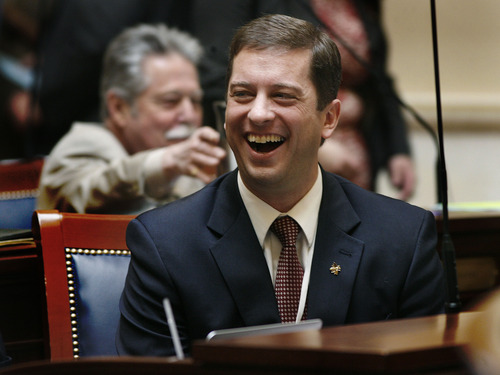This is an archived article that was published on sltrib.com in 2013, and information in the article may be outdated. It is provided only for personal research purposes and may not be reprinted.
Two relative newcomers to the Utah Legislature are bringing some much-needed perspective on two long-standing legislative practices that should be abolished in the interest of transparency and public trust.
Sen. Aaron Osmond, R-South Jordan, wants to require legislators to write bills before the legislative session begins, ending the practice of creating what is known as a "boxcar" early in the session. A boxcar is a dummy bill that can be filled in later — often near the end of the session — with any content the sponsors want. Neither the public nor all members of the House and Senate are privy to what the bill file might eventually contain.
A 2008 omnibus education bill that consolidated more than a dozen education-related bills — some that had already been passed and some that had been defeated — is a controversial example of a boxcar that came to life in the final hours of the session. It was brought to a vote before it could be vetted by legislators or the public.
HB477, a bill to drastically change the state's open-records law, was another. It remained essentially hidden until the last days of the 2011 session and was passed too quickly. HB477 caused such a public outcry that it had to be repealed in a special legislative session.
Osmond, who was appointed in 2011 to Senate District 10 in Salt Lake County, wants to require that every piece of legislation have a descriptive title and at least a summary of what would be in the final bill at least two weeks prior to the beginning of each session. That should cause no hardship to competent legislators, and it would let the public get a look at everything set to come up as the session begins.
Osmond's bill would also limit the time a bill could be "circled," or put on hold, eliminating the practice of getting a bill passed in one chamber and circled in the other, until the final days or hours of the session.
Another change that should have been made long ago is addressed in a bill by Rep. Jim Nielson, R-Bountiful, who began his first term in 2011 in House District 19. It would allow legislators to abstain from voting on a bill that poses a conflict of interest for them.
The Beehive State has a unique rule that requires legislators to vote on bills when they are present, even when they have a conflict of interest. Most states require legislators to abstain when a bill could benefit them.
Utah legislators must file conflict-of-interest forms, listing their affiliations. They should be required to abstain when those interests come up. Nielson's bill is the next best thing.



